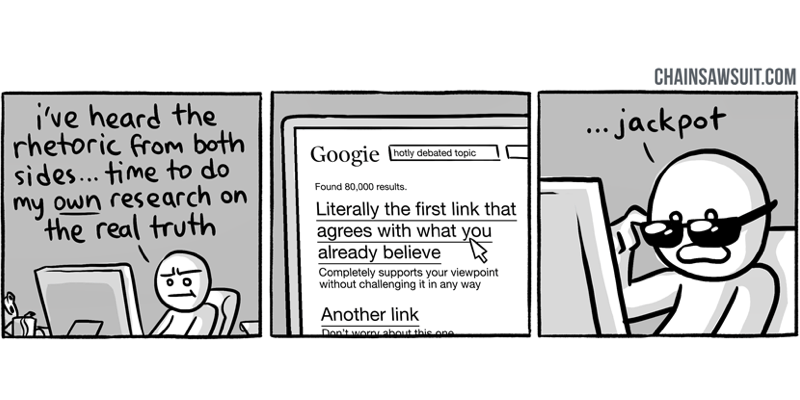Free to Believe Anything

As I was growing up, when you read the paper, watched the news, saw a film, or a picture, you inherently believed in it. You trusted the reality it portrayed. You trusted in journalism and even believed the news was actually "fair and balanced". Then technology destroyed the business model of traditional journalism. The news institutions of the 20th century, print newspapers, the evening broadcast news, the trusted anchorman, are now relics of the past.
We turned to the Internet for news and information, eventually learning the hard way that we can’t trust the Internet. We no longer know what is real and what is fake. With everything now digital, and with excellent tools to edit audio, video, and photos, we have become skeptics. As soon as we see a viral video on YouTube we say to ourselves “that’s probably fake”. Every magazine with a beautiful girl on the cover we think to ourselves “Photoshop”. When we read a blog post we think “spin”.
The Internet is filled with anti-vaxxers, World Trade Center truthers, Kennedy theorists, religious fanatics of all stripes, and people who think that Barack Obama is a foreign-born Muslim (he's not). Our beliefs aren't tied to facts. At least half of us are absolutely certain Heaven exists, ruled over by a personal God — not some vague force or universal spirit but "a guy". More than a third of us believe not only that global warming is no big deal but that it’s a hoax perpetrated by a conspiracy of scientists, government, and journalists. People are free to believe whatever they want to believe by embedding themselves in "echo chambers" that reinforce what they already believe and by discounting anything they happen to see that does not align with their beliefs.
"In the new media landscape, the wall between news and entertainment is crumbling. The value of news is measured by its popularity. The loudest voice gets the most listeners. A lie bears equal weight as a fact."
— Vernon E. Jordan Jr., The Wall Street Journal
The big internet platforms, through their algorithms, have become an eye of a needle which news and media must pass through, limiting the content a person sees to that which already conforms to their views. The Internet is becoming one big echo chamber which is designed to filter and shape the information someone sees based on previous searches, as well as information it might have about their location or preferences.
“More likely than not, you get your news from Facebook, forty-four per cent of US adults get news on the site, and 61% of millennials … if that doesn’t frighten you, you don’t know enough about Facebook’s algorithm. If you have a parent who’s a Trump supporter, they are seeing a completely different set of news items than you are."
— Caleb Gardner, President Obama’s former social media adviser
Angela Merkel has joined a growing number of critics who have highlighted the dangers of receiving information that confirms an existing opinion or is recommended by people with similar ideas. Merkel called the issue a “challenge not just for political parties but for society as a whole”.
"Algorithms, when they are not transparent, can lead to a distortion of our perception, they can shrink our expanse of information."
— Angela Merkel, Chancellor of Germany
“Repeat a lie often enough and it becomes the truth”, is a law of propaganda often attributed to the Nazi Joseph Goebbels. Among psychologists this is known as the "illusion of truth" effect. Because we need to make quick judgements, we adopt mental shortcuts called heuristics. Relying on how often you've heard something to judge how truthful something feels is a heuristic strategy we all use. If we are only shown the news and information we choose to see, we are all reinforcing our own cognitive biases.
Donald Trump bypassed the old media gatekeepers and took his message straight to the electorate, using Twitter. Partisan websites and bloggers amplified his message. Mainstream television gave the candidate abundant free airtime because his behavior was "entertaining".
Yes, all candidates have equal access to technology, and of course we all have the freedom to listen to news and information that comfortably fits our views of the world. But isn't a a healthy democracy dependent on people being confronted by opposing ideas? How can we know what is real and true?
I am not a fan of government oversight and regulation, but slowly I am starting to believe social media regulation is necessary. Regulation, combined with technology to rate the likelihood of image tampering, voice tampering, or a "deep fake video" plus information about the source of the content and some type of "truth quotient", or score, is needed. Since unregulated technology got us here, maybe regulated technology can restore balance.
Otherwise, I am afraid our increasingly polarized country is going to continue down the path we are on - we are only fed the information we want to see, we have no way to judge the quality and accuracy of that information, and conflicting information is filtered from our view.
